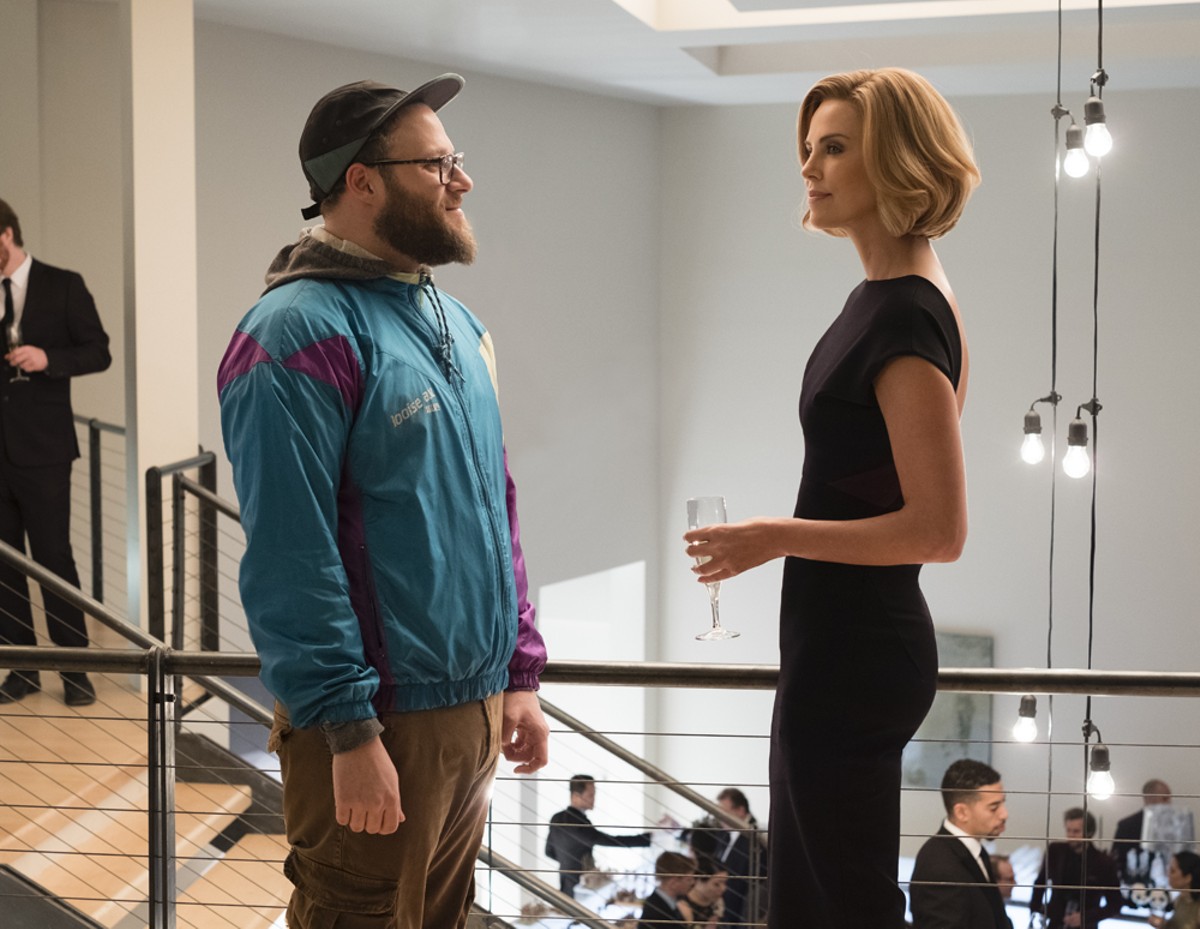Long Shot succeeds far more by dodging sharp suggestion or troubling resonance than by expressing a point of view — even as one proves perceptible within it. Set in the filthy and bilious sphere of national politics, this romantic comedy (which sidesteps satire by and large) finds Seth Rogen as (a Hollywood notion of) an investigative journalist and childhood friend of Charlize Theron's 2020 presidential hopeful and Secretary of State, eventually employed and courted by her in an unlikely romance.
With its goofy, improbable conceit and fleet if clumsy, mildly-but-consistently-ingratiating writing, this isn't a movie that thinks much of its viewer but — and to its credit, it also doesn't think much of itself. In that lack there's a kind of odd equanimity and realness, a sort of peace in self-knowledge that's achieved; Long Shot is at least fairly unpretentious. Director Jonathan Levine (50/50, Snatched) takes some time to find a rhythm for the script's dialogic style; it evens out somewhat, but the movie never totally settles into un-ironized realism or even a consistent register of its own. With odd, unearned tonal swerves — as in an argument that abruptly deflates into a moment of connection at the sighting of an aurora — the thing Levine settles into best here is a kind of general distance, or disregard, which enables its humor to glide along.
Throughout Long Shot, stakes are invoked but there's little proper sense of their weight; we're meant to hover above the events and characters as cheerleading voyeurs, marveling at Rogen's pratfalling physicality and righteous outbursts or at Theron's fine wool trenches and good-humored poise. Though the movie lampoons both Trump and White House-set shows with a TV star/egomaniac sitting president (he's retiring from politics for movies, a kind of dream...), it also leans on their very tropes, eager to have things both ways. A hostage crisis, some international intrigue, and innumerable galas and parties all pepper the storyline. Each plays best when facilitating gags, not feelings, for they cannot function with emotion.
This sense of narrative weightlessness alongside the cast's ardent verbal deliveries takes a little getting used to — the dialogue isn't so bad as it could be and is often funny, but it generally doesn't feel right in a majority of the scenes. It's as though the writers didn't want to get as mean as Veep, as self-important as The West Wing, or as hawkish as 24, so they chose to simply lean on their performers and coast, speeding along an uneven course until the bumps in the road become something we get used to. All the same, once you realize the movie doesn't care about much of anything, the experience of national politics with zero stakes gets a bit seductive even as it troubles. There is a definite appeal to this vapid, inapplicable fantasy.
Americans are beset ahead of 2020 with calls for unity, and if Long Shot has a message to add to that one, then it's probably another buzzword: integrity. With its Beauty and the Beast setup — and a kind of restaging of Rogen's first proper hit, 2007's Knocked Up — Long Shot can't entirely rid itself of accidental or incidental suggestions. Theron's Charlotte Field isn't exactly Hillary Clinton, but with her "youngest-ever" Secretary of State and a seemingly ageless beauty, the creative team clearly wishes to posit a deliberate corrective to Clinton 2020, pitching viewers in a manner deeply desirous of popular appeal. It tries to give us the kind of candidate America needs, its only real allusion to policy being an international environmental agreement. "Hillary would have been great for her policy experience," it seems to suggest, "but she should have been younger, more approachable and personable... and maybe hotter??" With its softball critiques of the treatment of women in politics — and of the shallowness of positioning entertainment figures as policymakers — Long Shot calls its own bluff through its Schlub v. Beauty casting and its assumptions about and courtship of popular appeal.
Seeking to do little itself but draw a laugh and some appeal itself, much of the movie's self-defeating arc revolves around the conflicts arising from the politics of compromise. With Rogen serving as Theron's [heh] journalistic check, holding our appointed official to a higher standard of accountability even as he crafts her speeches, Long Shot decries, via Rogen's character, Fox News, contrafactual reporting, climate change denial, and the treatment of women in politics, and especially the influence of big money in politics — all of which should (to its credit) be baseline centrist positions. With its air of subtle, haughty distance, of political leaders coasting along on waveless waters, it also implicitly questions the value of caring, and of outrage. The typical question here would be "if the movie doesn't care then why should we?" But Long Shot's greatest strength is that it expects us not to. Like so many of our current candidates, its focus and skill lies in careful, centrist dodges. Seeking little from viewers but a smile and a laugh, at least it knows it's full of shit.
Stay on top of Detroit news and views. Sign up for our weekly issue newsletter delivered each Wednesday.






